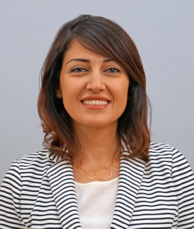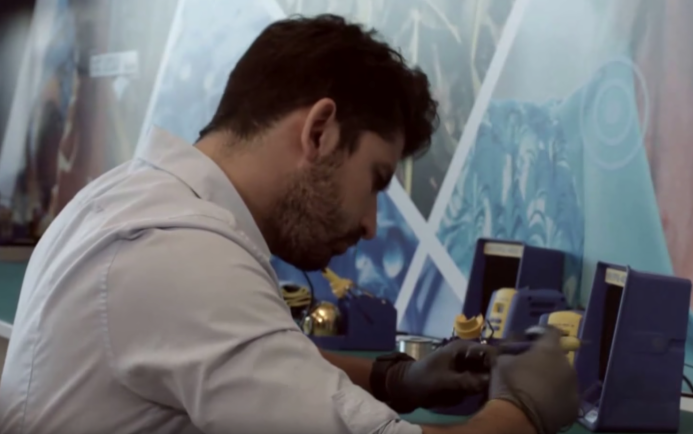Greetings from the Institute for Sensing and Embedded Network Systems Engineering (
I-SENSE).
FAU's Sensing and Smart Systems pillar continues to grow. It's been another exciting quarter! In this newsletter, we announce the recipients of our internal grants program, highlight new external awards, and put one of our students in the spotlight. If you're working in Sensing and Smart Systems or the Internet of Things, we'd love to hear from you. Reach out to us by email, drop by for a visit, or help us welcome a distinguished visitor as part of the Pillar Seminar Series. FAU is building the future of Sensing and Smart Systems. We invite you to build it with us.
|
Best,
Jason Hallstrom
Director, I-SENSE@FAU
|
|
 |
I-SENSE Announces Internal Grant Recipients
 Through the Division of Research, we are pleased to announce the recipients of an internal grants program, as part of a new initiative to stimulate external research funding. We sought proposals to grow multidisciplinary collaborations that lead to externally funded research programs
in the Sensing and Smart Systems pillar. Through the Division of Research, we are pleased to announce the recipients of an internal grants program, as part of a new initiative to stimulate external research funding. We sought proposals to grow multidisciplinary collaborations that lead to externally funded research programs
in the Sensing and Smart Systems pillar.
The total funding under this program was $100,000, which we distributed among all of the awardees. We received 16 highly competitive proposals, of which we awarded five. To read about the awarded projects, click
here
.
|
Federal Funding to Design Catheter Guidance Algorithm
 Behnaz Ghoraani, Ph.D., I-SENSE Faculty Fellow and Assistant Professor of Department of Computer & Electrical Engineering and Computer Science (CEECS), was awarded a $260,267 grant from the National Heart, Lung & Blood Institute. The 18-month project is called "Catheter guidance algorithm for identification of atrial fibrillation ablation targets." Behnaz Ghoraani, Ph.D., I-SENSE Faculty Fellow and Assistant Professor of Department of Computer & Electrical Engineering and Computer Science (CEECS), was awarded a $260,267 grant from the National Heart, Lung & Blood Institute. The 18-month project is called "Catheter guidance algorithm for identification of atrial fibrillation ablation targets."
It proposes to design a catheter-guidance algorithm that can significantly improve atrial fibrillation ablation outcomes that can be immediately translated into clinical practice with no additional cost or safety risk to the patient.
|
Faculty Fellow Receives Cybersecurity Seed Grant
 Yufei Tang, Ph.D., I-SENSE Faculty Fellow and Assistant Professor in CEECS, received a $50,000 grant from the Florida Center for Cybersecurity (FC2). The FC2 established a collaborative seed award program to support and encourage collaboration across the Florida State University System to promote research innovation and productivity in cybersecurity. Yufei Tang, Ph.D., I-SENSE Faculty Fellow and Assistant Professor in CEECS, received a $50,000 grant from the Florida Center for Cybersecurity (FC2). The FC2 established a collaborative seed award program to support and encourage collaboration across the Florida State University System to promote research innovation and productivity in cybersecurity.
Tang will collaborate with Zhuo Lu, Ph.D., from the University of South Florida on the one year project, entitled "Proactive defense against cyber-physical smart grid attacks."
|
I-SENSE Lands $340,000 National Science Foundation Grant
 The N
ational Science Foundation recently awarded I-SENSE a $339,984 grant for a "Research Experiences for Undergraduates" program. Focused on sensing and smart systems, the program is designed to engage high-potential undergraduates in meaningful research activities to encourage their pursuit of graduate study in STEM disciplines, with an emphasis on interdisciplinary career paths. Ten undergraduate researchers from across the country will participate in the nine-week program. The students will be housed in FAU's Boca Raton campus dorms. Those working in the marine and environment area will spend a portion of each week on FAU's Harbor Branch Oceanographic Institute campus in Fort Pierce.
READ MORE
.
|
I-SENSE Graduate Student Wins Three-Minute Thesis Competition
 Prasanth Ganesan, a Ph.D. student working under Behnaz Ghoraani, Ph.D., won the 2017 College of Electrical Engineering and Computer Science's Three-Minute Thesis for his thesis entitled, "Development of an algorithm to guide a multipole diagnostic catheter for identification of atrial fibrillation ablation sources." In three minutes, Ganeson discussed a novel method to locate the sources of atrial fibrillation, which could help clinicians perform patient-specific ablation therapy, and improve patients' quality of life.
The competition supports students' capacity to effectively explain their research in three minutes, in language appropriate to a non-specialist audience. The exercise cultivates students' academic, presentation and research communication skills. It was designed to provide all participants with professional development experience. The winners are awarded certificates, and invited to lunch with the judges and CEECS faculty members.
|
Sensing and Smart Systems Innovation Lab Opens

Florida Atlantic University and I-SENSE unveiled the new Sensing and Smart Systems Innovation Laboratory, located on the second floor of Engineering East. The laboratory will foster interdisciplinary collaborations among students, staff, faculty, and external collaborators. It provides access to state-of-the-art workstations, collaborative presentation tools, discussion space, drafting boards, and other facilities, as well as access to a wide variety of systems and tools for rapid prototyping of new technologies designed to benefit society.
|
To view federal funding opportunities, click
here
.
|
|
|
|
|